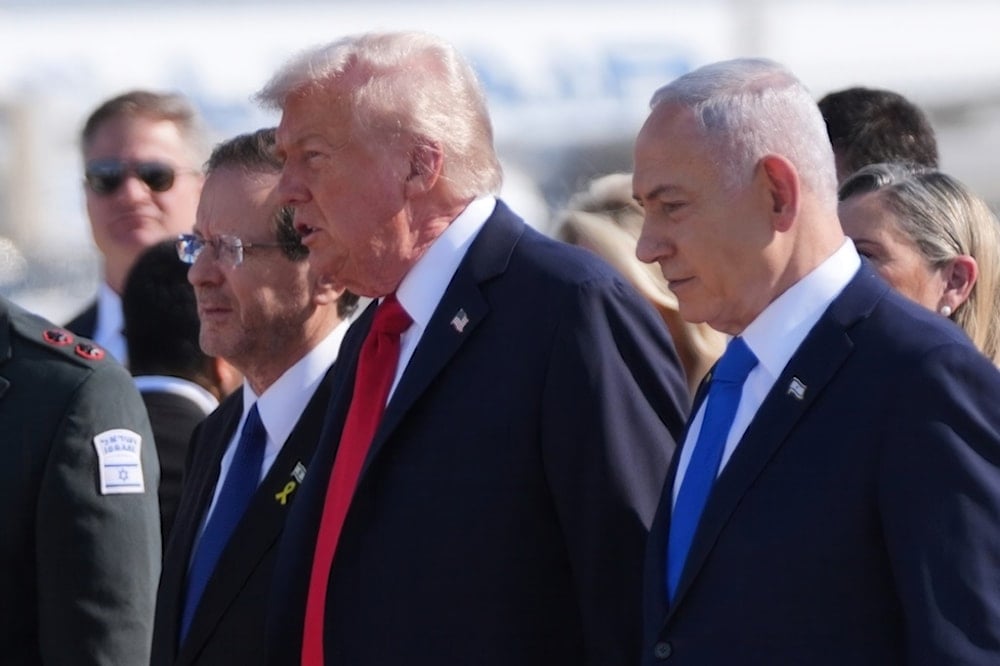Confusion surrounds Netanyahu's attendance at Sharm El-Sheikh summit
Confusion erupted over Benjamin Netanyahu's attendance at the Sharm El-Sheikh Peace Summit after reports that he withdrew to avoid appearing alongside Palestinian President Mahmoud Abbas.
-

President Donald Trump walks with "Israel's" President Isaac Herzog, left, and "Israel's" Prime Minister Benjamin Netanyahu during an arrival ceremony at Ben Gurion International Airport, Monday, Oct. 13, 2025, near Tel Aviv. (AP Photo/Evan Vucci)
The Egyptian presidency confirmed on Monday that preparations were complete for the Sharm El-Sheikh Peace Summit, held under the joint leadership of Egyptian President Abdel Fattah El-Sisi and US President Donald Trump, with the participation of leaders and representatives from more than 30 countries and international organizations.
According to the Egyptian presidency, the summit aims to consolidate the ceasefire in Gaza, end the Israeli war and blockade, and pave the way for a new stage of regional stability and reconstruction. The opening session, scheduled for Monday afternoon, marks the first major international gathering since the signing of the agreement to halt the war on Gaza.
President El-Sisi arrived at the summit venue earlier in the day to receive attending world leaders. The presidency confirmed that el-Sisi and Trump would hold a bilateral meeting on the sidelines of the event, alongside a collective session bringing together participating heads of state.
The summit, according to the official statement, seeks to "end the war in the Gaza Strip, reinforce peace and stability in the Middle East, and open a new chapter of regional security and cooperation."
Netanyahu withdraws after invitation from Trump
Initial reports suggested that Israeli Prime Minister Benjamin Netanyahu would attend the Sharm el-Sheikh summit following an invitation from Trump. However, his office later announced that he would not participate, citing "religious holidays."
Israeli media later revealed that the real reason was his refusal to appear alongside Palestinian Authority President Mahmoud Abbas, who is among the confirmed participants. The move has been interpreted as a diplomatic snub and a reflection of Tel Aviv's discomfort with the emerging framework that could pave the way toward Palestinian sovereignty.
Before departing for Egypt, Trump had briefly visited Tel Aviv, attending a session at the Knesset, where Netanyahu thanked him for "efforts to expand the circle of peace through strength", remarks criticized by Arab media as hollow given the humanitarian catastrophe in Gaza.
Cairo confirms calls between El-Sisi, Trump, and Netanyahu
Earlier in the day, the Egyptian presidency said el-Sisi had received a phone call from Trump, who was in "Israel" with Netanyahu. During the call, Trump informed him that Netanyahu had agreed to participate in the summit and briefly joined the conversation. However, hours later, Cairo issued an updated statement confirming Netanyahu's withdrawal, again citing "religious holidays."
Despite Tel Aviv's absence, participation at the summit remains broad. The Kingdom of Saudi Arabia confirmed attendance through a delegation headed by Foreign Minister Prince Faisal bin Farhan, alongside Qatar, Jordan, Turkey, Indonesia, and several European and African states.
Read more: Tehran warns world to be wary of repeated Israeli ceasefire breaches
Diplomatic sources told the Financial Times earlier this month that the United States is using the ceasefire framework to lay the groundwork for a future Palestinian state, a long-term plan aimed at transitioning from a temporary truce to a sustainable political resolution. The proposal reportedly includes three stages: consolidation of the ceasefire, internationally supervised reconstruction, and the creation of a unified Palestinian governance structure that could eventually pave the way to statehood.
Analysts say Trump's diplomatic push is partly motivated by efforts to normalize ties between "Israel" and Saudi Arabia, with Washington hoping that progress toward a credible Palestinian state could unlock a broader regional realignment. Riyadh, however, has maintained that any normalization deal must be tied to genuine steps toward a so-called "two-state solution", increasing pressure on the US administration to deliver tangible political movement on the Palestinian issue.
This strategy, while welcomed by some Arab states, has caused quiet friction with Netanyahu, whose coalition vehemently opposes any framework implying Palestinian sovereignty.

 4 Min Read
4 Min Read









